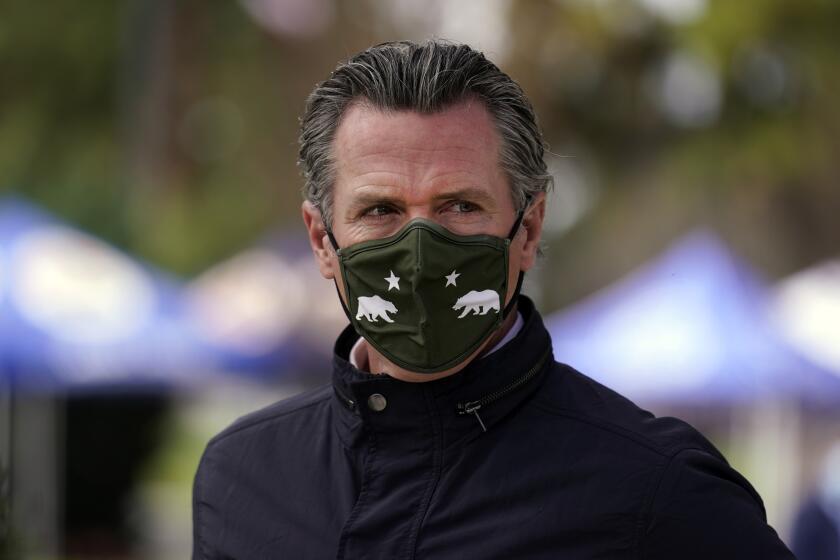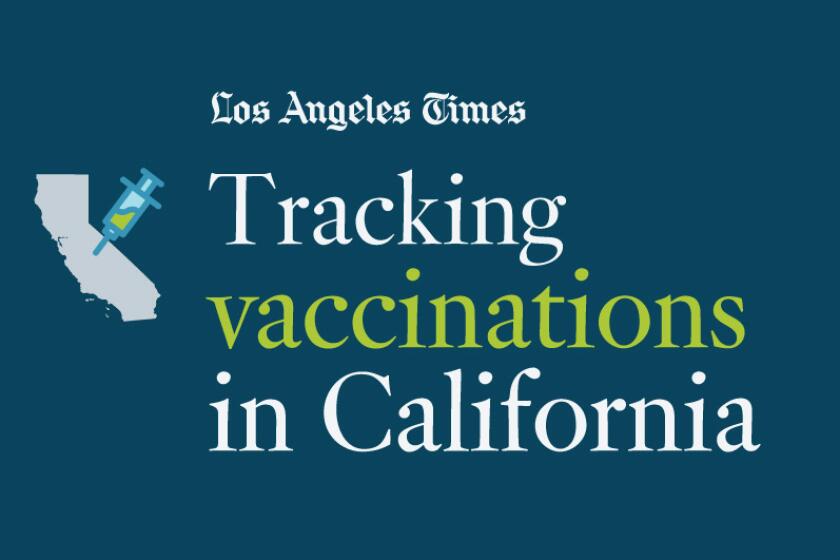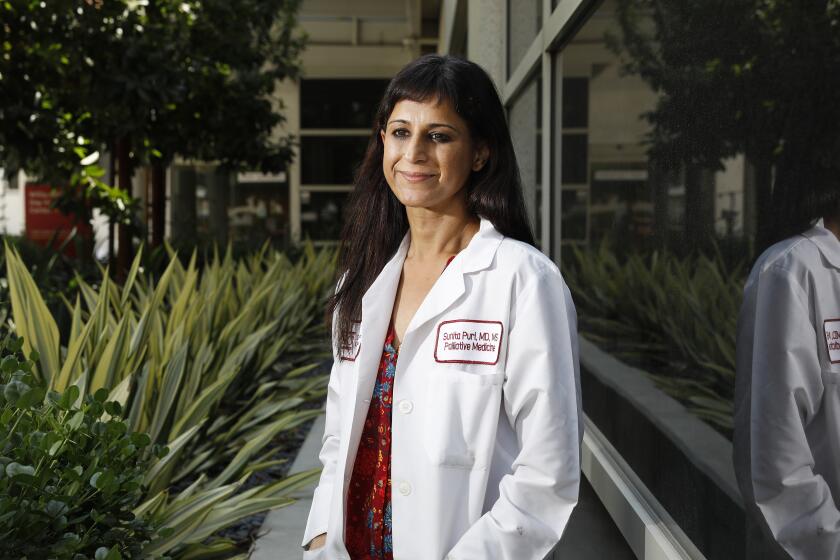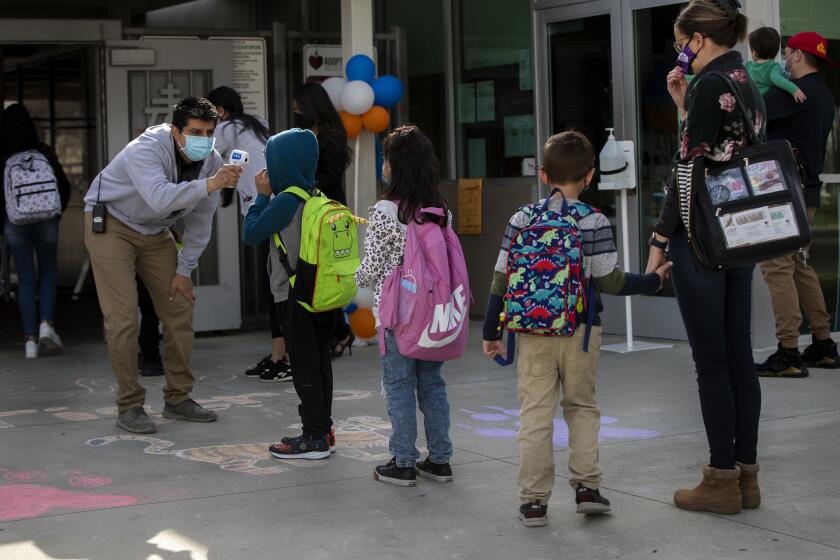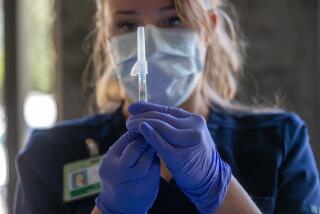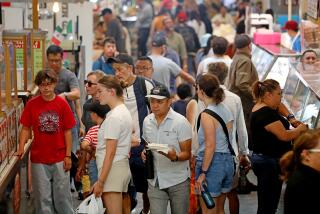Most mask guidelines for vaccinated are lifted in milestone moment in coronavirus battle
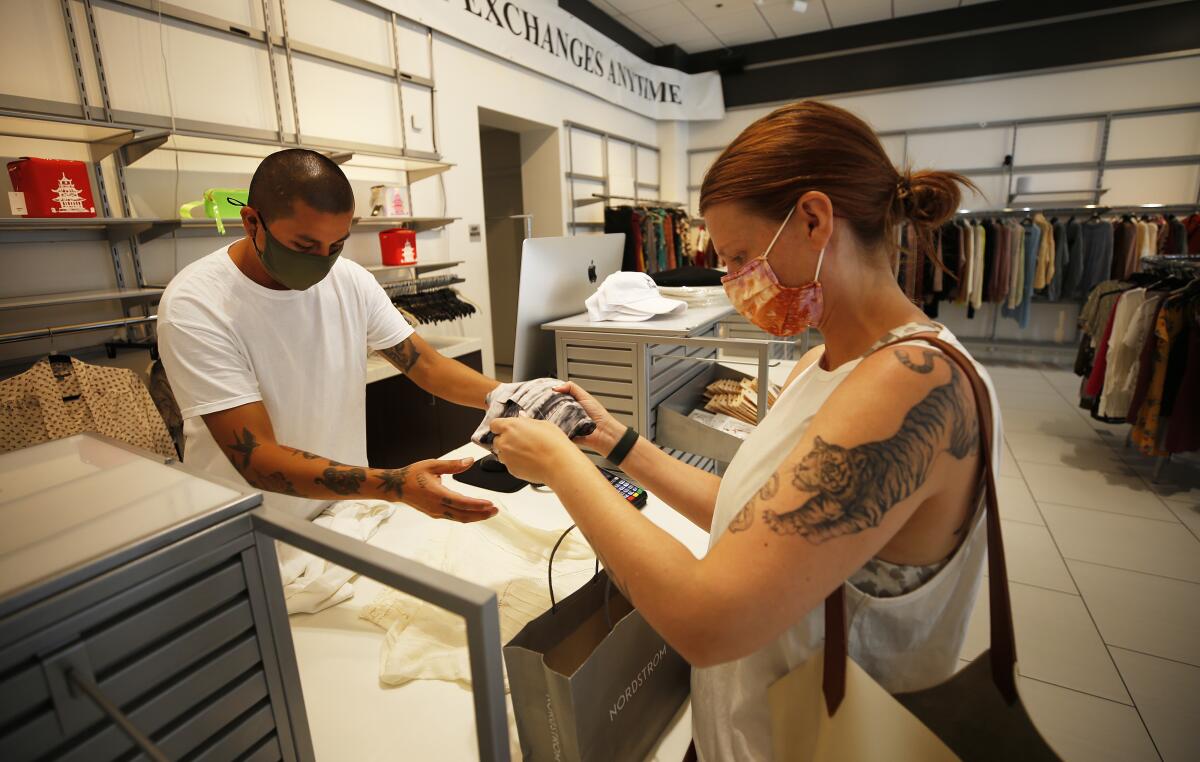
In a profound sign of America’s progress against COVID-19, federal officials on Thursday announced a sweeping relaxation of face mask guidelines, which now suggest fully vaccinated people can stop wearing masks in most places — either outdoors or inside.
The move is a milestone moment in the pandemic, upending one of the most basic safety protocols to reduce the spread of the coronavirus. It comes as daily coronavirus cases in California and most other parts of the United States are plummeting and more people are getting vaccinated.
“Today is a great day for America,” President Biden said. “It’s been made possible by the extraordinary success we’ve had in vaccinating so many Americans so quickly.”
Though there has been growing pressure to end mask mandates, the sweeping changes stunned some people who had become used to wearing masks. Some experts expressed concern that the relaxation would make it easier for the unvaccinated to flout rules and shed masks inside stores and other businesses, putting people at greater risk who cannot be vaccinated, such as young children with preexisting health conditions. But others hope it will encourage more people to get vaccinated.
The guidance from the U.S. Centers for Disease Control and Prevention are only recommendations, however, and the final call will largely be decided by state and local governments.
California has strict mask rules consistent with the CDC’s previous mask guidance and officials said they will remain in effect at least for now as they study the new recommendations.
The state and Los Angeles County will review the Centers for Disease Control and Prevention’s recommendations in order to “make sensible adjustments to the orders that are currently in place,” L.A. County Public Health Director Barbara Ferrer said.
The California Division of Occupational Safety and Health’s mask-wearing requirements at businesses — including restaurants and supermarkets — remain in effect.
“Because it’s still important to protect workers at all work sites, and all work sites must follow requirements set forth by the California Division of Occupational Safety and Health, we ask that everyone continue to adhere to required distancing and masking at workplaces until Cal-OSHA changes these requirements,” Ferrer said.
It could be a week or more before substantive changes to mask-wearing orders take effect locally. Cal-OSHA next meets on May 20 to discuss statewide guidance, and county changes would not be any less restrictive than the state’s mandates.
Federal officials said more-specific rules regulating masks in places such as businesses, schools and other settings where it may be hard to determine who is or is not vaccinated will probably be determined at the local level.
Nonetheless, federal officials hailed the new guidance as a momentous step in the pandemic.
“Anyone who is fully vaccinated can participate in indoor and outdoor activities, large or small, without wearing a mask or physical distancing,” Dr. Rochelle Walensky, the director of the CDC, told reporters. “If you are fully vaccinated, you can start doing the things you have stopped doing because of the pandemic.”
California could lift most COVID-19 mask requirements by June 15, Gov. Gavin Newsom said Wednesday.
Under the federal guidance, unvaccinated or partly vaccinated people are still asked to wear masks in almost all indoor settings and most outdoor venues when interacting with people from outside their household who may not be vaccinated. (Members of a single household of unvaccinated people can be maskless indoors if everyone else is vaccinated and can go without masks at small outdoor gatherings with other unvaccinated people.)
A person is considered fully vaccinated two weeks after the final dose of a vaccine.
The CDC order remains in effect that requires masks to be worn by everyone traveling on public transportation, including buses and trains, and at airports and stations.
Across the U.S., 46.6% of the population has received at least one dose of vaccine; in California, at least 49.8% of residents are at least partly vaccinated.
Biden urged those without full vaccination to keep masking up. “Please protect yourself until you get to the finish line because as great as this announcement is today, we don’t want to let up. ... The safest thing for the country is for everyone to get vaccinated.”
The announcement comes as scientists have reported a stunning array of positive developments in just the last several weeks.
Just two months ago, there were worries the U.S. was heading toward a fourth wave, and how bad it would be was unknown. But a robust vaccination campaign seems to have decisively helped turn the tide.
Though the U.S. was once criticized for a slow vaccine rollout, it now has the fourth-fastest per capita vaccine administration for its population, behind only Israel, the United Kingdom and Bahrain, according to UC San Francisco infectious disease specialist Dr. Monica Gandhi.
Experts say about most Americans will need to be vaccinated to bring the coronavirus pandemic under control. Track California’s progress toward that goal.
The average number of new coronavirus cases nationwide, over a weekly period, has fallen to 36,800 a day — an impressive 23% decrease from the previous seven-day period, and a 50% drop from the peak of the springtime wave recorded a month ago, driven by a spike in coronavirus infections in Michigan. Hospitalizations and COVID-19 deaths are down, with reported fatalities in the last week dropping 12% from the previous weekly period.
California managed to escape the spike that plagued the Midwest and East Coast, with scientists crediting the state’s relative embrace of vaccines; L.A. County was also helped by the lingering immunity that remains among survivors of the devastating fall-and-winter surge. California is reporting its lowest COVID-19 hospitalization numbers since the first few weeks of the pandemic last spring.
Vaccine supply problems in the U.S. have eased, and it is easier than ever to get a shot, with many sites no longer needing to require appointments for doses. On Thursday, vaccine appointments became available for everyone age 12 and older.
Additionally, data continue to emerge that bolster increasing confidence among scientists that the vaccines in use work effectively against variants — including those first identified in the United Kingdom, South Africa, Brazil, California, New York and India.
Even in rare events where a coronavirus of any type breaks through the immunity of a fully vaccinated person, the resulting infection is most likely to be short and provide less risk of transmission to others, Walensky said. Though there are reports of seven members of the New York Yankees coaching and support staff having tested positive for the coronavirus despite being fully vaccinated with the Johnson & Johnson vaccine, Walensky said six of them appear to have resulted in asymptomatic infections.
There have been some reports of coronavirus breaking through the immunity of fully vaccinated people among medical personnel in India, but overall data still show the vaccines being effective there.
The dire COVID-19 situation in India has been particularly hard to watch for many Indian American healthcare workers.
“All of the real world data we’ve seen that’s been in the published literature — large studies in many different settings — have demonstrated that those vaccines are effective,” Walensky said.
In addition, evidence is mounting that not only do vaccines protect against people getting sick, but also against asymptomatic infection too. A recent study from Israel found 97% vaccine effectiveness against symptomatic infection and 86% effectiveness against asymptomatic infection in more than 5,000 healthcare workers, Walensky said. In the U.S., vaccines were 90% effective against any infection in nearly 4,000 healthcare workers.
Some health experts welcomed the CDC’s new guidance.
“I am very excited that we have reached this momentous time when those who are fully vaccinated can now get back to virtually pre-pandemic activities without concern of disease themselves,” UCLA medical epidemiologist Dr. Robert Kim-Farley said. “However, they still need to realize that if they are around unvaccinated people that may be vulnerable — the elderly, those with medical conditions — they still need to practice caution in that setting.”
Walensky noted that people with compromised immune systems should speak to their doctors before giving up their masks. And unvaccinated people who “remain at risk of mild or severe illness, of death or of spreading the disease to others” should still wear masks and get vaccinated right away, she said.
“If things get worse, there is always a chance we may need to make a change to these recommendations,” Walensky said, “but we know that the more people are vaccinated, the less cases we will have and the less chance of a new spike or additional variant emerging.”
Walensky said the agency also will be updating all of its guidance — including for travel.
The vast majority of children with coronavirus infections don’t develop common COVID-19 symptoms that would make them easy to spot, a new study says.
Gandhi, the UC San Francisco infectious disease expert, has been among experts who have urged the CDC to move faster to lift mask guidelines and was surprised at how fast federal officials acted Thursday. She welcomed the news and said the science backs up the new recommendations.
She said lifting mask guidance for fully vaccinated people will provide an incentive for those who may have put off getting the shot.
“People need incentives now,” Gandhi said. “I think this is going to help people who are on the fence to go and get vaccinated.”
The new guidance, however, works best if people follow the rules — and unvaccinated people don’t shed their masks before they’ve been vaccinated.
“I do see maybe having to show vaccination cards to get into movie theaters or restaurants,” said Dr. George Rutherford, infectious diseases expert at UC San Francisco. “Private businesses can enforce vaccination requirements.”
California’s rules, last updated May 3, generally require masks to be worn by everyone indoors whenever you’re outside your home, with exceptions, such as when you’re outside a workplace setting and everyone indoors is vaccinated; or when there are only members of one unvaccinated household present and all have a low risk of severe complications should they get COVID-19.
Unvaccinated people must also wear masks outdoors at any time they can’t maintain six feet of distance from someone else, and fully vaccinated people need to wear masks only in crowded outdoor settings, such as live performances, parades, fairs, festivals and sports events.
More to Read
Sign up for Essential California
The most important California stories and recommendations in your inbox every morning.
You may occasionally receive promotional content from the Los Angeles Times.
